August 04, 2021 | Black & Kletz Allergy
Asthma and allergies are quite common in pregnancy. Although complications from asthma and allergies are much less common, approximately 1% of pregnant women suffer from asthma during their pregnancy. Many more suffer from allergic rhinitis (i.e., hay fever) and other allergies (e.g., food, medication). Allergy symptoms due to allergies tend to be worse in pregnancy for approximately one-third of women, better in another one-third, and about the same as before pregnancy for the other one-third. It is important to note that it is also possible to develop new allergies during pregnancy.
Many women without a previous history of allergies complain of allergy symptoms during pregnancy. In some of these women, they indeed have developed allergies. In others, the allergy symptoms are present, but there is no definitive allergy. In these latter women, their elevated estrogen and progesterone levels are responsible for the typical nasal congestion that they may be experiencing. The increased hormone levels cause one’s mucus membranes to swell. When this swelling affects the nose, nasal congestion is the result. The diagnosis of hormone-induced nasal congestion of pregnancy is then justified if the hormonal elevation alone is responsible for the nasal congestion. Note that in addition to the nasal congestion, some nonallergic pregnant women who have hormone-induced nasal congestion of pregnancy may also experience a post-nasal drip and an associated cough due to the post-nasal drip.
The most common allergies during pregnancy are not any different than in non-pregnant women. Allergic rhinitis symptoms during pregnancy are still due to the same common allergens which usually include pollens, dust mites, molds, pets (e.g., cats, dogs), and cockroaches. The classic symptoms still may include sneezing, runny nose, itchy nose, nasal congestion, post-nasal drip, itchy throat, sinus congestion, sinus headaches, itchy eyes, watery eyes, puffy eyes, and/or redness of the eyes. In asthmatic individuals, wheezing, chest tightness, coughing, and/or shortness of breath may also occur. It should be emphasized that the lack of sneezing and itching in a pregnant woman with nasal congestion should be a red flag to consider a diagnosis of hormone-induced nasal congestion of pregnancy, as opposed to the classic allergic rhinitis in a pregnant individual.
The diagnosis of allergic rhinitis and/or asthma while pregnant begins with a comprehensive history and physical examination history performed by a board certified allergist, like the ones at Black & Kletz Allergy. Allergy blood tests may be ordered to diagnose a pregnant patient. Allergy skin testing is generally not performed on pregnant women.
Once the diagnosis is made, the focus turns to treatment. Treatment of allergic pregnant women is similar to non-pregnant women however the medications used to treat pregnant women are more limited. Only medications that have a Category B pregnancy rating and occasionally a Category C pregnancy rating (if needed) are generally used. There are antihistamines, nasal sprays, leukotriene antagonists, and asthma inhalers that are Category B which are utilized first in the treatment of allergic rhinitis and asthma. Most of the time, improvement can be obtained by using just Category B pregnancy medications. Pregnant women should be cautious before using any medication while pregnant, particularly during the first trimester. Pregnant women should get approval from their Ob/Gyn physician before using any medication, even if prescribed by another physician.
Allergy immunotherapy (i.e., allergy shots, allergy injections, allergy desensitization, allergy hyposensitization) can be continued in pregnant women. Individuals however are not started on allergy immunotherapy if one is already pregnant.
One other important caveat regarding the treating allergies in both allergic and nonallergic patients is the concept of avoidance. It is always recommended to avoid the offending allergen whether it is in the environment (e.g., pollens, molds, dust mites, pets), in the food (e.g., peanuts, shellfish, nuts, fish), or anywhere else. Avoiding what one is allergic to is always the best alternative if possible.
The board certified allergists at Black & Kletz Allergy have been treating pregnant and lactating women for many years. Black &Kletz Allergy has 3 convenient locations in the Washington, DC, Northern Virginia, and Maryland metropolitan area. We have offices in Washington, DC, McLean, VA (Tysons Corner, VA), and Manassas, VA which all offer on-site parking. The Washington, DC and McLean, VA locations are Metro assessable. We offer a free shuttle that runs between our McLean, VA office and the Spring Hill metro station on the silver line. Please call us to schedule an appointment or you can click Request an Appointment and we will reply within 24 hours by the next business day. The allergy specialists of Black & Kletz Allergy are eager to help you with your allergy, asthma, and immunology needs. We are dedicated to providing exceptional care and service to you as we have been doing in the Washington, DC metro area for more than 50 years.













